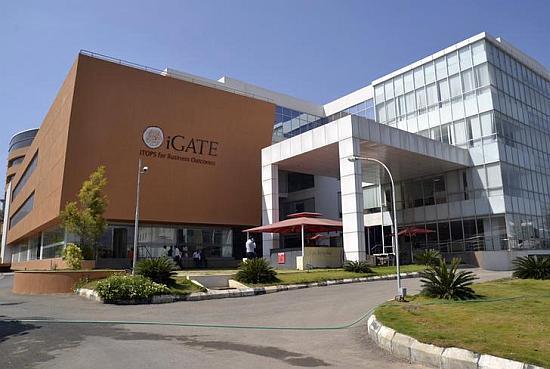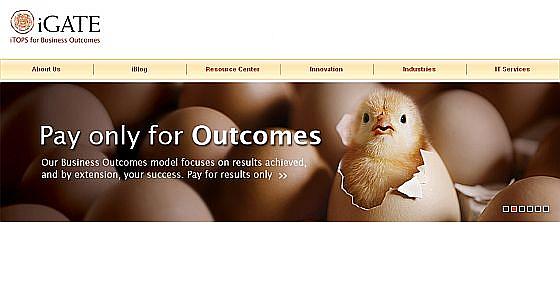 | « Back to article | Print this article |
iGate's next big ambition
When California-based iGate announced its plans to acquire one of India's oldest IT firms, Patni Computer Systems, in 2011, it was, for many, a clear sign of its intent to join the big league of Indian IT service providers and compete with them shoulder to shoulder for mega outsourcing deals.
Two years later, the company has set another ambitious target for itself. It wants to increase its revenue to $3 billion by 2017 from $1 billion now, of which 30 per cent will be contributed by its outcome-based model or billing clients only for the final product and not the effort in developing a product.
The growth target means iGate will have to more than double its revenue in the next four years, at a time when industry growth has tapered to 13-14 per cent.
Achieving this target, therefore, may not be easy, especially as it acquisition of Patni is yet to yield results.
Click NEXT to read more...
Complete coverage: Union Budget 2013-14
iGate's next big ambition
"Even after the acquisition of Patni the quarterly revenue of the company has hovered in the range of $260 million to $270 million. It has so far not been able to make any significant impact," says Sudin Apte, research director and chief executive officer, Offshore Insights.
So, how does iGate intend to achieve this target?
"In 2005, when we said we wanted to be a $1-billion by 2012, growing both organically and inorganically, everybody thought it was an audacious target. But having done that, there are positive vibes within the company and the $3-billion target, many believe, will also be achieved," says Phaneesh Murthy, the chief executive officer of iGate.
Analysts, however, have a different view and feel that without another acquisition the $3-billion target looks difficult.
Some of the analysts point out that the iGate-Patni deal has been an operational story and not a growth one.
Click NEXT to read more...
Complete coverage: Union Budget 2013-14
iGate's next big ambition
"In terms of integration and operations, the company has done very well. But the concern is on growth. I would be interested to see how Murthy intends to push for it," says an analyst of a large brokerage and equity research firm.
The company's numbers fail to inspire confidence either. Its top-line growth for the quarter ended December 2012, over the same period in the previous year, was just 1.45 per cent.
However, on a full year basis, the company's 2012 revenue grew by 37.7 per cent, whereas its net profit grew by 70 per cent.
Murthy agrees the integration has not yet yielded the desired result.
"The integration itself went smoothly. But we did not grow in 2012 like we would have wanted to, partly because of our over investment in retaining customers, and the market did not support us. Existing customers were slow on investments," he says.
However, the company is stepping up efforts to change that. Until now it was focusing on the "protect phase" of its acquisition, which essentially meant ensuring Patni's existing clients did not leave the company.
Click NEXT to read more...
Complete coverage: Union Budget 2013-14
iGate's next big ambition
This meant extra investments into these clients, getting dedicated account managers and strengthening the front end.
At the same time, the company also got out of some of the smaller businesses, reducing its number of clients.
With that done, the focus is now turning to growth. iGate wants to get into large deals, increase the pace of adoption of its outcome-based model and leverage the network of its stakeholder, Apax Partners.
However, analysts are not sure the strategy would work. Getting access to larger deals may continue to be difficult for iGate because the dynamics of the industry have changed.
Two years ago, it acquired Patni with the idea of adding bulk to the company so it could compete for larger deals.
But the $1-billion revenue bracket has become a crowded category now with almost seven to eight companies in that segment.
Click NEXT to read more...
Complete coverage: Union Budget 2013-14
iGate's next big ambition
"The $1-billion revenue mark was perhaps important a few years back now you need to be among the top five or six companies," says an analyst of a leading advisory firm.
Murthy differs. "The most important aspect for us from an integration aspect was how many $100 million customers we will get. We have three so far and batting pretty strongly. We won a $110-million deal and another $100-million deal late last year. We have got semi approval for another couple of $100-million deals," says he.
To ensure a steady flow of deals in the future, iGate is keen to leverage the client base of Apax Partners. It has already identified some of its senior leaders who will work exclusively with Apax and talk about the company's offering to its portfolio firms.
"I would like to see an order book, over the next five years, of about $50 million to $100 million from Apax," says Murthy.
But the trump card for the company's $3-billion target will be its outcome-based billing model by using iTOPs. The company is already being aggressive in its marketing campaigns to promote iTOPs.
Click NEXT to read more...
Complete coverage: Union Budget 2013-14
iGate's next big ambition
In advertisements splashed in New York Times, Wall Street Journal and Financial Times, it took a shot at its own peers by asking the clients to shift their outsourcing model from an "efforts"-based one to one based on "results" and "outcomes".
"I have always said that India is not a good market for building global products, but it's a great market for global services. If you want to break the linearity of people and revenue then you need a shared services model or outcome-based model. That's what we are saying," says Murthy.
"Our model allows customers to pay only when their business case is achieved, the delivery model is integrated with business process and technology, it's based on a shared services or multi-tenant model and employees are more lateral hires than freshers. Most of the companies today cannot create this model," he says.
However, selling the model to clients will not be easy.
"For the success of the model (outcome-based model) we hope that other companies also come out with a similar strategy. Otherwise, it will be difficult for clients to compare us with others and that will impact the decision-making cycle," he adds.






